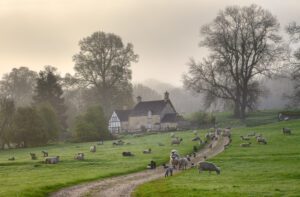The failure of a Devon farming family to win back their lost grazing rights has serious repercussions for farmers across the UK who might want to register grazing rights they believe they have acquired over common land, says agricultural lawyer Alistair Millar, Partner at Tallents Solicitors in Southwell.

Rights of common, what farmers need to know
He comments:
The Littlejohns had been grazing their livestock on Dartmoor for several decades but didn’t realise that Mr Littlejohns’ father had failed to register their ‘rights of common’ following a change in the Commons Registration Act 1965.
When Martin & Stacey Littlejohns realised this, the deadline for registering of mid-1970 had long since passed. So, in 2010 they applied to Devon County Council to amend the commons register to record their rights of common.
However, the council rejected their claim. The Littlejohns appealed, claiming they had ‘prescriptive rights’ under the subsequent Commons Act 2006 because they had been grazing their livestock on the common for over 30 years. The council also rejected this claim.
Alistair continues:
The case progressed to the High Court in March 2015 when the council’s refusal was upheld. And in May 2016 the Court of Appeal also upheld the council’s refusal.
Rights of common verses prescriptive rights
The Commons Registration Act 1965 required all rights to graze to be registered by the middle of 1970, otherwise they could not be exercised. It was designed to establish a definitive register of common land and ‘rights of common’. Any common land not registered by the deadline would not be considered as common land and all rights over the land would not be exercisable as such.
The Commons Act 2006, which replaced the 1965 Act, allowed for the registration of certain unregistered rights of common via ‘prescriptive rights’ over land previously unregistered common land.
Crucially for the Littlejohns, there were ambiguities in the updated legislation for the acquisition of new rights of common over existing common land, and this was the council’s basis for their refusal of the Littlejohns’ rights of common application.
Ambiguity over registering new common land and rights of common over it
Says Alistair:
The Chancellor of the High Court, Sir Terence Etherton described this ambiguity as “an impossible circularity” as the legislation allowed for the creation of new common land but the land could only be identified as common with reference to the rights of common registered over it.
This case has attracted the attention if the wider rural community, with the National Farmers Union expressing concern for farmers who may believe that they have acquired ‘rights of common’ to allow them to graze their stock on common land but in reality these rights will be refused under the current legislation.
Alistair finishes:
Given the ambiguity surrounding the interpretation of the current legislation, it is likely that another appeal will be made to the Supreme Court to obtain final clarification on the law.
We would urge farmers to contact us in the first instance, if they have any queries about their rights to common and our agricultural legal specialists can help them.
